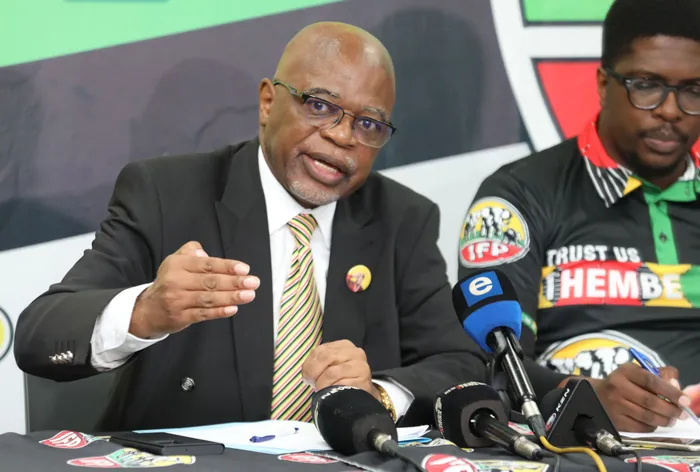DA-IFP Pact may reconfigure KZN political landscape

Picture: Nqobile Mbonambi/African News Agency (ANA)/May 19 2023 IFP Secretary-General, SL Ngcobo, and IFP National Spokesperson, MM Hlengwa during a media briefing on the IFP's state of rediness as they approach the 12-month mark prior to the upcoming 2024 Election. The DA and the IFP have recently signed what they call the “Service Delivery Pact” in KwaZulu-Natal, as many parties come to terms with the unlikelihood they can unseat the ANC alone, the writer says.
By Bheki Mngomezulu
As the date of the 2024 general election comes closer, politicians are working around the clock to either sustain the lives of their political parties or for the new ones to claim their place at the high political table. In the process, truths and half-truths have become a daily occurrence as politicians make indefatigable efforts to convince the electorate.
Those in power promise the electorate that they will up their game in delivering more services. By contrast, those who are currently operating in the periphery promise to do better than their political rivals in terms of service delivery if afforded the opportunity to govern.
Various political parties in South Africa have come to terms with the fact that they cannot unseat the ANC on their own. This is despite the ANC continuously scoring many own goals which are unprovoked. The fallback position is that these parties are in constant touch with one another to strategise on how to remove the ANC from power. While some are open and vocal about this, others are working clandestinely to achieve the same goal.
The DA and the IFP have recently signed what they call the “Service Delivery Pact” in KwaZulu-Natal. The argument they advanced is that this should not be misconstrued to mean that the Pact feeds into the “Moonshot Pact” which has been invented by DA leader John Steenhuizen at the national level. While this claim may sound plausible, its sustainability is in question when looked at in the broader context which transcends the argument advanced by the leaders of the two political parties.
The DA/IFP Pact has the potential to reconfigure the political landscape in KwaZulu-Natal. The trend of the election results in the 2016 Local Government Election (LGE, 2019 general election, and the 2021 LGE have revealed a lot and have given us something to ruminate about.
Firstly, the ANC’s support has been declining in each election – both at national and local government level. However, it has not been declining enough to the extent that the ANC could completely lose political power. Even in 2021, the ANC lost 18 municipalities which either went to the IFP or the DA. But it was still the leading party in terms of numbers even in that election. This means that the ANC is still a force to be reckoned with.
Secondly, the IFP’s support has been increasing consistently in all these elections – both at national and provincial (KZN) levels. This seems to place the IFP in a better chance to do even better in the 2024 general election than the ANC. However, the IFP’s intra-party squabbles might dent its chances of making significant gains from the ANC in the upcoming election. Claims that the life of the IFP’s leader is in danger does not augur well for the party’s political prospects.
Thirdly, the DA’s support has also been declining nationally. In KZN, its support has increased somewhat (especially in urban areas) but not enough for it to upset the ANC. Gaining uMngeni municipality was not reflective of the DA’s significant growth. Instead, it was made possible by the ANC’s internal challenges and the decision by one of its councillors to cross the floor at the last minute. If the ANC could regroup and address its factional politics, there is no doubt that it could still retain KZN in the upcoming election.
This synopsis presents the context within which the “Service Delivery Pact” signed by the DA and the IFP should be understood beyond how politicians present it. There is a broader political context that needs to be factored into the analysis for this whole thing to make sense.
If the ANC fails to win the province (KZN) but loses with only a small margin, the Pact could be used to elevate the IFP to lead the province even if it did not win the election. Similarly, if the IFP came close to winning the province but came short with a small number, the DA would come to its rescue.
The “service delivery” argument does not hold water. There are municipalities where the IFP is currently governing but where service delivery challenges prevail. Therefore, it cannot claim that it signed the Pact with the DA in order to do what the ANC has failed to do.
As mentioned above, the DA is in control of only one municipality in KZN. Indeed, it has done well in running it. But this does not mean that it would be able to do more if it were to lead more municipalities. In the Western Cape where the DA governs, black townships are complaining about lack of service delivery.
Therefore, the Pact could reconfigure the political landscape in KZN but might not improve service delivery!
Professor Bheki Mngomezulu is the director of the Centre for the Advancement of Non-Racialism and Democracy (CANRAD) at Nelson Mandela University
This article is original to The African. To republish, see terms and conditions